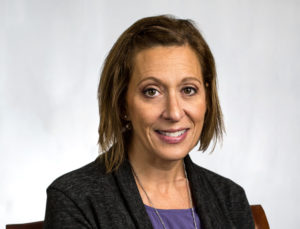
Jenni Dyrdahl
Jenni Dyrdahl developed significant pain in her hip that continued through the summer and fall of 2017. As the pain intensified, she found it difficult to walk. She visited the emergency room ten different times.
Despite a respectable career and lifestyle, she felt the nurses and doctors believed she was a drug addict and the cause of the pain was never diagnosed. In late November 2017, Jenni was assaulted and rushed to the hospital with a broken hip. The x-ray showed cancer, but the source of the cancer was unknown so Jenni was held in the hospital for three additional days of tests and an eventual surgery. Finally, after months of pain, Jenni had a diagnosis— stage 4 adenocarcinoma of the lung. Jenni was told that her cancer was untreatable.
Prior to this diagnosis, Jenni was healthy and exercised regularly including running and yoga. While she had tried smoking as a teenager, she was a nonsmoker as an adult and her DNA tests revealed a non-smokers cancer. Jenni had always made good nutrition decisions and had rarely been ill. She had not experienced shortness of breath or the cough that sometimes defines lung cancer.
The lung cancer diagnosis was a complete shock. After her diagnosis, she began chemo and immunotherapy. Being tired everyday and not feeling like she could function as a working mother was a difficult adjustment for Jenni. She eventually had to give up her career as a dental hygienist.
Jenni is frustrated that her hip pain didn’t lead to an earlier diagnosis. “Finding out so late in the game changed and threatened my entire life,” she shared. Even though half of each year’s lung cancer cases happen to never or former smokers, Jenni would never have qualified for screening, which makes this cancer tough to catch early. “If screening was available to the general public like it is for other cancers, we might have caught my cancer at stage I when it is easier to treat,” she said.
Jenni has felt the lung cancer stigma first hand. She has struggled to find and keep insurance. She feels that if she had been diagnosed with a different type of cancer, she would have qualified for medical assistance automatically. She is extremely grateful that her patient advocate has worked hard to help her receive the same benefits given to people with other cancers.
“Lung cancer can happen to anyone and it is the world’s number one cause of cancer death,” Jenny said. “Why aren’t we screening more people for lung cancer?”
Make A Difference
Help A Breath of Hope increase awareness, support patients and fund research for the world’s number one cancer killer!
Donate Today!
